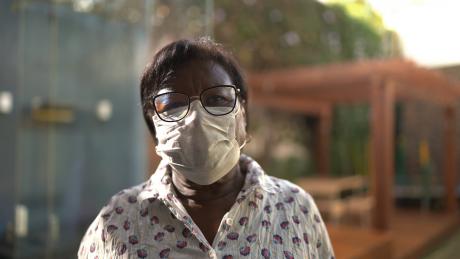This article is one of a series of four published as part of a collaboration between the American Society on Aging’s Generations Now blog and the Department of Journalism in Boston University’s College of Communication. The student journalists are members of Professor Meghan E. Irons’ Online Journalism class for graduate students.
Bunny Longbottom, 66, of Youngstown, Ohio, waited for a bed outside the Pine Street Inn homeless shelter in Boston, Mass., on a recent sunny October morning. He said he came to the city 18 months ago to visit a friend, who robbed him of his savings. He has been experiencing homelessness ever since.
“Truthfully, it’s been crappy,” Longbottom said. “I’ve had people take advantage of me. The hair on the back of my neck stands up. I wish I never came (to Boston).”
For more than 20 years, Longbottom said he relied on monthly disability checks as his sole source of income after an industrial accident left him unable to work. When he moved to Boston, his checks were cut from $6,000 a month to $1,466, leaving him unable to afford housing in the city.
In recent years, there has been an increase in individuals older than age 60, who, like Longbottom, cannot keep up with the city’s housing market on a fixed income, said Robyn Frost, executive director of the Massachusetts Coalition for the Homeless.
The average rental price in Boston from October 2015 to 2024 surged 40% to $3,200, according to Zillow’s Observed Rent Index.
This year, approximately 2,036 single adults were unhoused in Boston, a 12.9% increase from 2023, according to the city’s latest homeless census data. Roughly 570 of those individuals were older than age 65, according to a 2019 University of Pennsylvania report, which projects that number to grow to 1,560 by 2030.
“I see more elderly people down here than I've ever seen,” said Dee Dee Thomas, a volunteer working with unhoused individuals in downtown Boston. “People don’t think of it as an epidemic. But it is. They did their time. They shouldn't be out here.”
“Having health problems takes money away,” Mark said.
City and state officials did not respond to multiple emails and phone calls for comment on the increase in unhoused adults older than age 65.
Thomas attributed the increase in the older unhoused population to a lack of affordable housing programs in the city.
To qualify for Boston’s affordable housing programs, renters must make 30% of the area median income, or $34,300 per year, according to city data. The average income of U.S. adults relying on Social Security in January 2024 was $22,884 a year, according to the Social Security Administration.
Gretchen Van Ness, executive director of LGBTQ Senior Housing, said one way to start fixing the problem would be to develop an older adult “area median income,” or AMI.
“We shouldn’t have folks on Social Security be held to an AMI that includes people earning at the height of their career,” Van Ness said. “We need policy changes to more accurately reflect what seniors earn.”
For those renters who qualify, the number of affordable housing units is limited.
Emily Levine, chief of advocacy at 2Life Communities, an organization providing affordable housing to adults older than age 62, said there is a 9,500-person waiting list for 1,410 affordable apartments.
Some older individuals said their health has deteriorated since they became unhoused, leading to added expenses that worsen their struggle to find housing.
Alan Mark, 75, of Boston, has lived on the streets of downtown Boston since 2013. He said he suffers from poor circulation in his hands, heart and legs from being out in the cold.
“Having health problems takes money away,” Mark said.
Gerardo Acosta, 60, of New York, has been living at the Pine Street Inn since 2023, when his mother passed away. His health rapidly deteriorated after he became unhoused, he said.
“I got COVID last December,” Acosta said. “I spent six days at the hospital because of it. I came out of there with high cholesterol, high blood pressure and diabetes.”
Frost’s team at the Massachusetts Coalition for the Homeless said they hope to create a bridge subsidy campaign, where unhoused individuals would only have to pay 30% of their income toward housing costs until they get off affordable housing waitlists.
But without funding, the project wouldn't get off the ground until at least fiscal year 2026, she said. In the meantime, many elders are left struggling to keep a roof over their heads.
“This population, I strongly believe, as I do every population, just deserve to be able to live their retirement years and not live in fear of having to end up on the street,” Frost said.
Amelia Stern is a graduate journalism student, a full time staff reporter at The Enterprise, and her work has appeared in USA Today, The Tennessean, The Patriot Ledger, Wicked Local and more. Lydia Murray is an undergraduate journalism student. Gabriel O’Hara is a graduate journalism student who previously worked at Diario Gestion, an economics journal in Lima, Peru. Mira Donaldson is a graduate student specializing in multimedia storytelling. Her work has appeared on Georgia Public Broadcasting, in The Atlanta Journal-Constitution and Market Watch. Paisley Huang is a graduate journalism student and writes feature stories for the Daily Free Press, and is on the photography team of King’s Hill Church, Boston. They all attend Boston University.
Photo caption: Bunny Longbottom, 66, of Youngstown, Ohio, stretches his legs near a mural outside Boston’s Pine Street Inn homeless shelter on Oct. 12, 2024.
Photo credit: Amelia Stern









